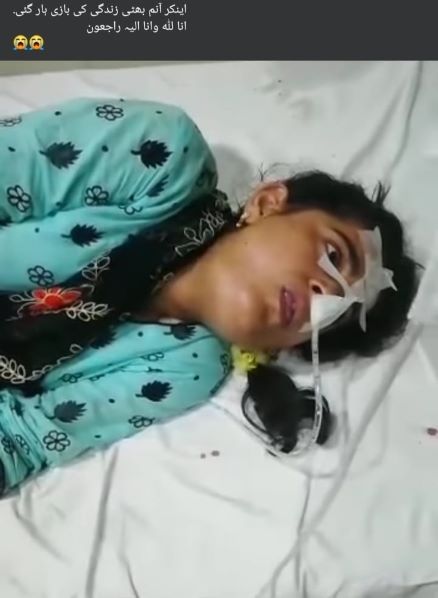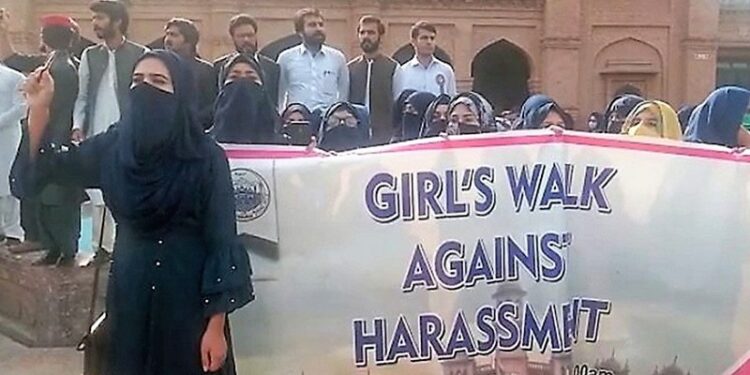By Saddia Mazhar
Sahiwal (Pakistan) November 8 (newsin.asia): She was breathing artificially in the ICU. Doctors were trying to save her life but some cameras knew she was having the last moments of her life, so they wanted to capture her for their “Breaking News”.
18 years old Anum was passionate about her work as a female journalist hailing from a village near Sahiwal. She had joined Centre News a web channel in the Sahiwal Division 2 years before. But appearing on TV made her life difficult as she faced the worst of trolling because of her appearance. There was family pressure too. She ended her life because of character assassination on social media. Her fiancé ended relationship because of her media profession. Her family does not want to face the media anymore as her mother believes, she lost her daughter because of her social appearance.
Subscribe to our Telegram channel for the latest updates from around the world
According to a biannual report issued by Twitter in December 2020, Pakistani authorities reported 3,004 Twitter accounts to the microblogging website for alleged offenses like “spreading hate material” and “inciting violence” in the first six months of 2018.
Last year the Pakistan Telecommunication Authority (PTA) had informed the Senate Standing Committee that while Facebook, YouTube, and other social media platforms had complied with requests from the government to block objectionable content, Twitter was not obliging. The government threatened to block the platform, after which it seems the company has given in.
Facebook is the largest use social medium in Pakistan. In South-East Punjab people have started Online FB pages linked to YouTube for entertainment and news about their areas. In Sahiwal almost 15+ FB and YouTube channels are working with youngsters to promote local news and talent. But unfortunately, no safety measures are being taken.
READ: Pakistan coaches Taliban on winning international recognition
Pakistani TV anchor Gharida Farooqui was trolled and ridiculed on the microblogging website Twitter,after she shared two snaps of masks in protection against coronavirus back in 2020
“First, they launched a planned, coordinated, filthy malicious campaign since last four days and now they are resorting to the dirtiest vile tactics, making obnoxious allegations” Gharida said after a new hashtag which is a top trend from 28th September 2021 on twitter against Ghardia. A leaked video showed Gharida with the Governor of Sindh Zubair Umar. Gharida also complaint last year with proof that someone tried to hack her Twitter account in 2020 and that she was threatened by unknown persons. She was unable to come out from her house.
Marvi Sirmed is another victim of online trolling. She has been exposed to a huge number of online attacks daily. Somebody constantly attempted to hack her Twitter account in 2020. She is still on the hit list and the harassment continues.
READ: Setting minimum age for marriage not against Islam: Federal Shariat Court
Women make up 11.8% of Twitter users in Pakistan but they seem to receive 99% of Twitter hate, especially if they are outspoken.
“I never, ever, faced such trolling and online abuse, until I started reporting on COVID,” said Benazir Shah, a senior reporter of Geo News. She came under sustained attack from officials and their followers after having questioned the reliability of the government’s COVID-19 data.
“Once a government minister or official accuses you, a trend of online abuse starts right away,” said Shah. “Some MPs of the ruling party picked up private pictures of myself from Facebook and shared them on Twitter. They accused me of taking money from their rivals to defame the government. The abuse continued for weeks. They tag journalists, saying we are spreading fake news. This makes us vulnerable to attacks.”
According to Privacy International, any data which can be used to identify an individual directly or indirectly can be termed personal data. A more comprehensive definition is that provided by the European Union’s General Data Protection Regulation (GDPR), which came into effect in April 2016.
The GDPR’s ‘personal data’ definition is: “Any information relating to an identifiable person who can be directly or indirectly identified in particular by reference to an identifier.” Personal data subjects are identifiable if they can be directly or indirectly identified, especially by reference to an identifier such as a name, an identification number, location data, an online identifier or one of several special characteristics, which express the physical, physiological, genetic, mental, commercial, cultural or social identity of these natural persons. For example, the telephone, credit card or personnel number of a person, account data, number plate, appearance, customer number or address are all personal data.

READ: Iraqi PM Mustafa al-Kadhimi survives ‘assassination attempt’ with drones
Farieha Aziz, a journalist and co-founder of Bolo Bhi – a civil society organization pitched towards advocacy, policy and research in the areas of digital rights and civic responsibility agrees that online attacks especially on women journalists have not only become more widespread but also more systematic.
“These attacks are being launched in an organized manner and from official accounts,” she said, underlining the harm the attacks have on the mental well-being of journalists. “While women have been facing such issues for a long time, the continuous nature of these attacks and the intensity with which they have increased over time, led women journalists to speak out about it and come together to do that.”
Media watchdog Reporters Without Borders (RSF) is calling on Pakistani authorities to take immediate action to stop online harassment against female journalists that puts their professional duties and lives at risk.
The call from the Paris-based advocacy group on August 19,2020 came in response to a joint statement signed by some 50 women journalists of Pakistan condemning a “well-defined and coordinated campaign” of harassment on social media, including abusive language and threats of violence.
“We regard the highest levels of the Pakistani government as either responsible or complicit in these recent cyber harassment campaigns against certain women journalists who don’t toe the official line,” said Daniel Bastard, the head of RSF’s Asia-Pacific desk.
“This tactic, which clearly aims to intimidate all government critics, is a flagrant violation of article 19A of the Islamic Republic of Pakistan’s constitution. We call on Prime Minister Imran Khan to ensure that this unacceptable use of hate speech is brought to a stop,” he said.
Types of harassment include threats of rape and physical violence, releasing personal details of women journalists and analysts, and gender-based slurs. The online-bullying also seeks to discredit and intimidate journalists, referring to them as peddlers of “fake news” and as an “enemy of the people.”
“These have the potential to incite violence and lead to hate crimes, putting our physical safety at risk,” the journalists wrote.
Women in the media, especially those on social-media platforms, are now reportedly finding it untenable to engage on social media, depriving them of their right to free speech and providing information to the public.
“Many now self-censor, refrain from sharing information, giving their opinion or actively engaging online,” the statement said.
In 2019, four journalists and bloggers were killed in connection with their reporting. Among them was Arooj Iqbal, who was shot dead in Lahore in November in a case that has gone unpunished. Iqbal wanted to be the first woman journalist to launch her own newspaper in Pakistan, RSF said.
The Coalition for Women in Journalism (CFWIJ) monitored at least 11 cases of threats and violence against women journalists in Pakistan since the beginning of 2020. Some involved harassment in the workplace, while other journalists covering politics, the government’s handling of the pandemic and social challenges caused by it, were subject to doxing, rape and death threats online.
According to CFWIJ founder Karin Nazish, these virtual threats are very much real. “CFWIJ member and journalist Asma Shirazi was subject to an online smear campaign after interviewing former PM Nawaz Sharif and his daughter Maryam Nawaz Sharif,” Nazish told IPI.
“After the online threats, her home was broken into twice. The threat is so real to the journalists and their families, that some journalists are asked by their families to quit the profession,” Nazish said.
A year ago, a delegation of the CFWIJ met Human Rights Minister Dr. Shireen Mazari to present actionable steps to address the extensive climate of abuse, fear and censorship in the industry. Members of the organization urged the government to thoroughly investigate online and offline attacks against journalists and called for cases to be registered against perpetrators. “The minister’s response was very positive”, Nazish said.
“We were assured that the government will take action – and for about 6 months it seemed they really did.” In those months, CFWIJ noted a decline in cases of online harassment, and government officials publicly condemned attacks on journalists instead of provoking them.
“This reinforced the suspicion that trolls are encouraged and activated by the government”, Nazish said.
But this positive trend came to a grinding halt in recent months, as the press was once again vilified and accused of spreading lies and disinformation.
In an attempt to mitigate online content that promotes terrorism, extremism, hate speech, fake news or incitement, the government introduced controversial new rules to regulate all social media usage in the country earlier this year, allowing it to obtain user data and information from social media companies.
But the digital rights and civic responsibility organization Bolo Bhi described it at the time as “draconian attempts to discourage new media journalism”.
END
For similar articles, join our Telegram channel for the latest updates. – click here



























































